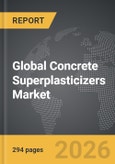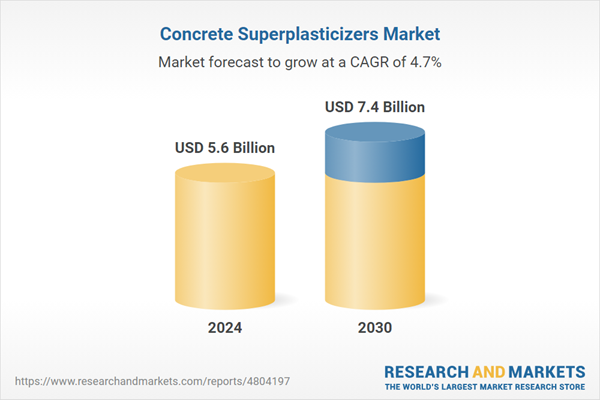Global Concrete Superplasticizers Market - Key Trends and Drivers Summarized
Why Are Concrete Superplasticizers a Game Changer in Modern Construction?
Concrete superplasticizers have revolutionized the construction industry by enabling the production of high-performance concrete with superior workability and strength. These chemical admixtures are used to significantly improve the fluidity of concrete mixes without adding excess water, which can otherwise weaken the concrete's structural integrity. Superplasticizers reduce the water-to-cement ratio while maintaining or enhancing the workability of the mix, allowing for easy placement and compaction, especially in complex structures with dense reinforcement. This capability makes superplasticizers essential in projects where high-strength concrete is required, such as in high-rise buildings, bridges, tunnels, and precast elements. The use of superplasticizers not only improves the durability and load-bearing capacity of concrete but also allows for faster construction by enabling the quick flow of concrete into intricate molds and reinforcing bars. Additionally, superplasticizers contribute to reducing shrinkage, cracking, and segregation in the concrete mix, which is crucial for the longevity of modern structures. But why have superplasticizers become such a critical component in high-performance concrete, and how do they enhance construction outcomes in ways that traditional methods cannot?How Do Different Types of Superplasticizers Impact Concrete Performance?
Superplasticizers are available in several formulations, each suited to specific construction needs, and their impact on concrete performance can vary widely based on the type used. The most commonly used superplasticizers are based on sulfonated naphthalene formaldehyde (SNF) and sulfonated melamine formaldehyde (SMF). These traditional superplasticizers are highly effective in reducing the water content and increasing the workability of the concrete. However, they have a limited time window before the mix starts to lose its fluidity, which requires quick placement and finishing. Newer polycarboxylate ether (PCE) superplasticizers have emerged as a more advanced solution, offering extended workability without sacrificing strength. PCE superplasticizers are particularly favored for projects requiring high-flow concrete with minimal slump loss, such as in large-scale pours or heavily reinforced sections. They also provide better control over the hydration process, allowing for optimized setting times. This makes them especially useful in hot climates or in situations where concrete needs to be transported over long distances. Additionally, the dosage of superplasticizers can be tailored to achieve specific performance characteristics, such as higher compressive strength, reduced shrinkage, or enhanced durability in extreme conditions. Whether used in ultra-high-performance concrete (UHPC), self-consolidating concrete (SCC), or standard ready-mix concrete, the choice of superplasticizer plays a pivotal role in determining the workability, strength, and long-term performance of the concrete mix.What Technological Innovations Are Shaping the Future of Concrete Superplasticizers?
Technological advancements in the formulation and application of concrete superplasticizers have dramatically enhanced their effectiveness, providing new opportunities for improving concrete performance and sustainability. One major innovation is the development of more advanced polycarboxylate ether (PCE) superplasticizers, which are now engineered with tailored molecular structures to deliver specific performance characteristics. These customized PCEs allow for even greater control over water reduction, flow retention, and setting times, making them suitable for a wider range of applications, from precast elements to mass concrete pours. Another important advancement is the incorporation of nanotechnology into superplasticizer development. Nano-engineered superplasticizers are designed to provide superior dispersion of cement particles, resulting in more uniform hydration and stronger, denser concrete. This not only improves the mechanical properties of the concrete but also enhances its resistance to chemical attack, making it ideal for harsh environments like marine structures or industrial facilities. Sustainability is another driving force behind innovations in superplasticizers, with a focus on reducing the environmental footprint of concrete production. New formulations aim to reduce the amount of cement required in a mix without compromising strength, thus lowering carbon emissions associated with cement production. Furthermore, the use of smart admixtures that respond to environmental conditions - such as temperature or humidity - allows for better control over the curing process, minimizing the risk of defects caused by variable conditions on site. As these technological advancements continue to evolve, superplasticizers are becoming even more integral to the future of high-performance and sustainable construction.What Factors Are Driving the Growth in the Concrete Superplasticizers Market?
The growth in the concrete superplasticizers market is driven by several factors, primarily the increasing demand for high-performance concrete in infrastructure and real estate development. As cities grow and the need for durable, resilient structures intensifies, the construction industry has shifted towards the use of stronger, more versatile concrete mixes that can support heavier loads and withstand environmental stressors. Superplasticizers, by enhancing the workability and strength of concrete, are integral to meeting these demands. The rise in urbanization and the construction of taller and more complex buildings, as well as infrastructure projects like highways, airports, and dams, have fueled the adoption of superplasticizers in both developed and emerging markets. Additionally, the growing trend towards sustainable construction practices is driving the use of superplasticizers that allow for lower water and cement consumption, reducing the environmental impact of concrete production. In many regions, government regulations promoting green building practices and energy-efficient infrastructure have further accelerated the demand for superplasticizers that contribute to resource efficiency. Moreover, the increasing use of prefabricated and precast concrete components in modern construction is boosting the demand for superplasticizers, as these applications require concrete with superior flow characteristics and strength. Innovations in concrete technology, such as the development of ultra-high-performance concrete (UHPC) and self-consolidating concrete (SCC), are also expanding the use of advanced superplasticizers that can meet the stringent requirements of these specialized mixes. As the construction industry continues to evolve, driven by both technological advancements and a heightened focus on sustainability, the demand for concrete superplasticizers is expected to see sustained growth across various sectors.Report Scope
The report analyzes the Concrete Superplasticizers market, presented in terms of market value (USD). The analysis covers the key segments and geographic regions outlined below.- Segments: Form Factor (Liquid, Powder); Application (Ready-Mix Concrete, Precast Concrete, Shotcrete, High Performance Concrete, Self-Compacting Concrete, Fly Ash Concrete, Other Applications).
- Geographic Regions/Countries: World; United States; Canada; Japan; China; Europe (France; Germany; Italy; United Kingdom; Spain; Russia; and Rest of Europe); Asia-Pacific (Australia; India; South Korea; and Rest of Asia-Pacific); Latin America (Argentina; Brazil; Mexico; and Rest of Latin America); Middle East (Iran; Israel; Saudi Arabia; United Arab Emirates; and Rest of Middle East); and Africa.
Key Insights:
- Market Growth: Understand the significant growth trajectory of the Liquid Form segment, which is expected to reach US$4.4 Billion by 2030 with a CAGR of 5%. The Powder Form segment is also set to grow at 4.3% CAGR over the analysis period.
- Regional Analysis: Gain insights into the U.S. market, valued at $1.5 Billion in 2024, and China, forecasted to grow at an impressive 7.1% CAGR to reach $1.6 Billion by 2030. Discover growth trends in other key regions, including Japan, Canada, Germany, and the Asia-Pacific.
Why You Should Buy This Report:
- Detailed Market Analysis: Access a thorough analysis of the Global Concrete Superplasticizers Market, covering all major geographic regions and market segments.
- Competitive Insights: Get an overview of the competitive landscape, including the market presence of major players across different geographies.
- Future Trends and Drivers: Understand the key trends and drivers shaping the future of the Global Concrete Superplasticizers Market.
- Actionable Insights: Benefit from actionable insights that can help you identify new revenue opportunities and make strategic business decisions.
Key Questions Answered:
- How is the Global Concrete Superplasticizers Market expected to evolve by 2030?
- What are the main drivers and restraints affecting the market?
- Which market segments will grow the most over the forecast period?
- How will market shares for different regions and segments change by 2030?
- Who are the leading players in the market, and what are their prospects?
Report Features:
- Comprehensive Market Data: Independent analysis of annual sales and market forecasts in US$ Million from 2024 to 2030.
- In-Depth Regional Analysis: Detailed insights into key markets, including the U.S., China, Japan, Canada, Europe, Asia-Pacific, Latin America, Middle East, and Africa.
- Company Profiles: Coverage of players such as Arkema Group, BASF SE, Enaspol AS, Fuclear Technologies Inc., Kao Corporation and more.
- Complimentary Updates: Receive free report updates for one year to keep you informed of the latest market developments.
Some of the 42 companies featured in this Concrete Superplasticizers market report include:
- Arkema Group
- BASF SE
- Enaspol AS
- Fuclear Technologies Inc.
- Kao Corporation
- Mapei S.p.A.
- Muhu (China) Construction Materials Co. Ltd.
- Sika AG
- W. R. Grace & Co.
This edition integrates the latest global trade and economic shifts into comprehensive market analysis. Key updates include:
- Tariff and Trade Impact: Insights into global tariff negotiations across 180+ countries, with analysis of supply chain turbulence, sourcing disruptions, and geographic realignment. Special focus on 2025 as a pivotal year for trade tensions, including updated perspectives on the Trump-era tariffs.
- Adjusted Forecasts and Analytics: Revised global and regional market forecasts through 2030, incorporating tariff effects, economic uncertainty, and structural changes in globalization. Includes historical analysis from 2015 to 2023.
- Strategic Market Dynamics: Evaluation of revised market prospects, regional outlooks, and key economic indicators such as population and urbanization trends.
- Innovation & Technology Trends: Latest developments in product and process innovation, emerging technologies, and key industry drivers shaping the competitive landscape.
- Competitive Intelligence: Updated global market share estimates for 2025, competitive positioning of major players (Strong/Active/Niche/Trivial), and refined focus on leading global brands and core players.
- Expert Insight & Commentary: Strategic analysis from economists, trade experts, and domain specialists to contextualize market shifts and identify emerging opportunities.
Table of Contents
Companies Mentioned (Partial List)
A selection of companies mentioned in this report includes, but is not limited to:
- Arkema Group
- BASF SE
- Enaspol AS
- Fuclear Technologies Inc.
- Kao Corporation
- Mapei S.p.A.
- Muhu (China) Construction Materials Co. Ltd.
- Sika AG
- W. R. Grace & Co.
Table Information
| Report Attribute | Details |
|---|---|
| No. of Pages | 294 |
| Published | February 2026 |
| Forecast Period | 2024 - 2030 |
| Estimated Market Value ( USD | $ 5.6 Billion |
| Forecasted Market Value ( USD | $ 7.4 Billion |
| Compound Annual Growth Rate | 4.7% |
| Regions Covered | Global |









